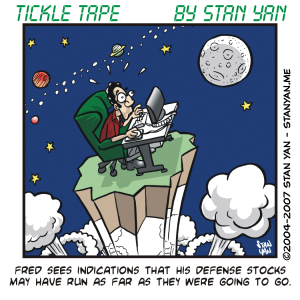Some people like facts and figures; others prefer trusting their intuition and looking for artistic expression in the trading realm. But the profession is big enough for all kinds of traders. Each type of trader has advantages and disadvantages. The trick is to figure out what you, specifically, are like and to match your trading style to your personality. Take the data-driven trader, for example. At an extreme, the data-driven trader looks for consistency and attempts to find “rules” and conventional wisdom to guide trading decisions.
For some data-driven traders, a major preoccupation is to study historical data and backtest ideas until a good fit is discovered. Other data-driven traders enjoy spending their nights scouring reports for a valuable tidbit of information that will give them an edge. If you are the kind of trader that enjoys getting caught up with details, using this affinity to your advantage is the best way to profit from the markets.
Before wholeheartedly pursuing data-driven trading, it is useful to be aware of a few drawbacks of this approach. Even though data- and hypothesis-driven trading strategies can be useful, many data-driven traders fall prey to analysis-paralysis in that they assume that the datasets available to traders are similar to scientific data, which is relatively precise and replicable. Working under this false assumption, they wrongly believe that putting in extra time to examine all the details, and deliberate among all possible alternatives will be a sure payoff. Trading doesn’t work that way.
Market data reflects human judgment. It’s not at all like physical science data; one can use all the complicated mathematics he or she wants, but it will never make market analysis akin to rocket science. It may be useful to be data-driven, but at the same time, it is essential to remember that trading is a matter of odds. Sometimes the odds work in your favour, but sometimes they don’t. Similarly, history only repeats itself when it does, so if you are “model fitting” based on historical data, it’s vital to be cognizant of the fact that you may be “over-fitting” your model, and it may be a fallible forecaster of the future. If trading were as straightforward as engineering, PhD scientists would be ruling the markets. They aren’t.
Dr Richard Geist, in his book “Investor Therapy,” outlines common trading ailments of the data-driven trader. Although a detail-oriented trader may identify information in reports or data records that more impressionistic traders may miss, he or she often can’t separate the forest from the trees. It’s hard to see the big picture when you are focused on details.
It’s important not to get too caught up in a small fact and forget about broader issues. For example, a company may be gearing up to manufacture a cutting edge product, but if few consumers have the money to buy it, or if there is little interest in using the product, sales will be in a slump. Discovering a “hidden” piece of information in an annual report may be a grand discovery, but depending on broader market factors, it may have relatively little impact on the market action.
Dr Geist also points out that detail-oriented traders are so focused on data and minor details that they start to believe that when all the variables in their data-driven trading plans line up, they should take huge risks. Again, nothing is certain in the markets. It is all a matter of probabilities; even the best-reasoned trading plan can fail if market conditions change for some unexpected reason. There are too many unknown variables to be extremely confident. After all, in the final analysis, market participants are people. They don’t act logically all the time, and they are far more difficult to anticipate than physical objects. Newtonian-based trading just isn’t going to work in the end.
Not everyone likes data, rules, and figuring out complex, concrete problems. But if you are this type of trader, it will be useful to develop a data-driven approach to trading. That said, it’s also important to remember that approaching the markets like a scientist approaches solving problems in the natural world is merely an analogy. Market participants are human, and when people are involved, unpredictability and errors are the rules, not the exception. If you take a scientific approach to the markets, remember the inherent limitations of this approach. If you can account for these drawbacks, you’ll be able to use your natural tendency as a data-driven trader to your advantage.


